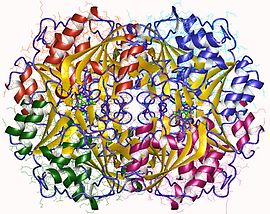
Back أسباراجينيز Arabic Asparaginasa Catalan Asparaginase German L-Asparaginasa Spanish آسپاراژیناز Persian Asparaginaasi Finnish Asparaginase French אספרגינאז HE Ասպարագինազա Armenian Asparaginase ID
 | |
| Clinical data | |
|---|---|
| Trade names | Elspar, Spectrila, Rylaze, others |
| Other names | crisantaspase, colaspase, asparaginase erwinia chrysanthemi (recombinant)-rywn |
| AHFS/Drugs.com | Monograph |
| MedlinePlus | a682046 |
| License data |
|
| Pregnancy category |
|
| Routes of administration | Intramuscular, intravenous |
| Drug class | Antineoplastic agent |
| ATC code | |
| Legal status | |
| Legal status | |
| Pharmacokinetic data | |
| Elimination half-life | 39-49 hours (IM), 8-30 hours (IV) |
| Identifiers | |
| |
| CAS Number | |
| IUPHAR/BPS | |
| DrugBank | |
| ChemSpider |
|
| UNII | |
| KEGG | |
| CompTox Dashboard (EPA) | |
| ECHA InfoCard | 100.029.774 |
| Chemical and physical data | |
| Formula | C1377H2208N382O442S17 |
| Molar mass | 31732.06 g·mol−1 |
| | |
Asparaginase is an enzyme that is used as a medication and in food manufacturing.[6][7] As a medication, L-asparaginase is used to treat acute lymphoblastic leukemia (ALL) and lymphoblastic lymphoma (LBL).[6] It is given by injection into a vein, or muscle.[6] A pegylated version is also available.[8] In food manufacturing it is used to decrease acrylamide.[7]
Common side effects when used by injection include allergic reactions, pancreatitis, blood clotting problems, high blood sugar, kidney problems, and liver dysfunction.[6] Use in pregnancy may harm the baby.[9] As a food it is generally recognized as safe.[7] Asparaginase works by breaking down the amino acid known as asparagine without which the cancer cells cannot make protein.[6]
The most common nonhematological adverse reactions of asparaginase erwinia chrysanthemi (recombinant) include abnormal liver test, nausea, musculoskeletal pain, infection, fatigue, headache, febrile neutropenia, pyrexia, hemorrhage (bleeding), stomatitis, abdominal pain, decreased appetite, drug hypersensitivity, hyperglycemia, diarrhea, pancreatitis, and hypokalemia.[10][11] The most common side effects of asparaginase erwinia chrysanthemi (recombinant) when given in combination with chemotherapy for the treatment of acute lymphoblastic leukemia and lymphoblastic lymphoma are abnormal liver tests, nausea, muscle and bone pain, and fatigue.[12]
Asparaginase was approved for medical use in the United States in 1978.[8] It is on the World Health Organization's List of Essential Medicines.[13] It is often made from Escherichia coli (E. coli) or Erwinia chrysanthemi.[8][14]
- ^ a b "Erwinase APMDS". Therapeutic Goods Administration (TGA). 27 February 2024. Archived from the original on 10 March 2024. Retrieved 7 March 2024.
- ^ Cite error: The named reference
Spectrila SmPCwas invoked but never defined (see the help page). - ^ "Rylaze (asparaginase erwinia chrysanthemi- recombinant-rywn) injection". DailyMed. Archived from the original on 15 August 2021. Retrieved 20 August 2021.
- ^ "List of nationally authorised medicinal products : Active substance: asparaginase, crisantaspase. Procedure no.: PSUSA/00003161/202108" (PDF). Ema.europa.eu. Archived (PDF) from the original on 10 March 2024. Retrieved 20 July 2022.
- ^ "Enrylaze EPAR". European Medicines Agency. 5 October 2023. Archived from the original on 17 February 2024. Retrieved 5 October 2023.
- ^ a b c d e "Asparaginase". The American Society of Health-System Pharmacists. Archived from the original on 27 March 2017. Retrieved 8 December 2016.
- ^ a b c Gökmen V (2015). Acrylamide in Food: Analysis, Content and Potential Health Effects. Academic Press. p. 415. ISBN 978-0-12-802875-9. Archived from the original on 21 December 2016.
- ^ a b c Kim KW, Roh JK, Wee HJ, Kim C (2016). Cancer Drug Discovery: Science and History. Springer. p. 147. ISBN 978-94-024-0844-7. Archived from the original on 21 December 2016.
- ^ "Asparaginase escherichia coli (Elspar) Use During Pregnancy". www.drugs.com. Archived from the original on 27 March 2017. Retrieved 20 December 2016.
- ^ Cite error: The named reference
FDA Rylazewas invoked but never defined (see the help page). - ^ Cite error: The named reference
FDA Rylaze 2was invoked but never defined (see the help page). - ^ Cite error: The named reference
Drug Trials Snapshots: Rylazewas invoked but never defined (see the help page). - ^ World Health Organization (2019). World Health Organization model list of essential medicines: 21st list 2019. Geneva: World Health Organization. hdl:10665/325771. WHO/MVP/EMP/IAU/2019.06. License: CC BY-NC-SA 3.0 IGO.
- ^ Farmer PB, Walker JM (2012). The Molecular Basis of Cancer. Springer Science & Business Media. p. 279. ISBN 978-1-4684-7313-1. Archived from the original on 21 December 2016.